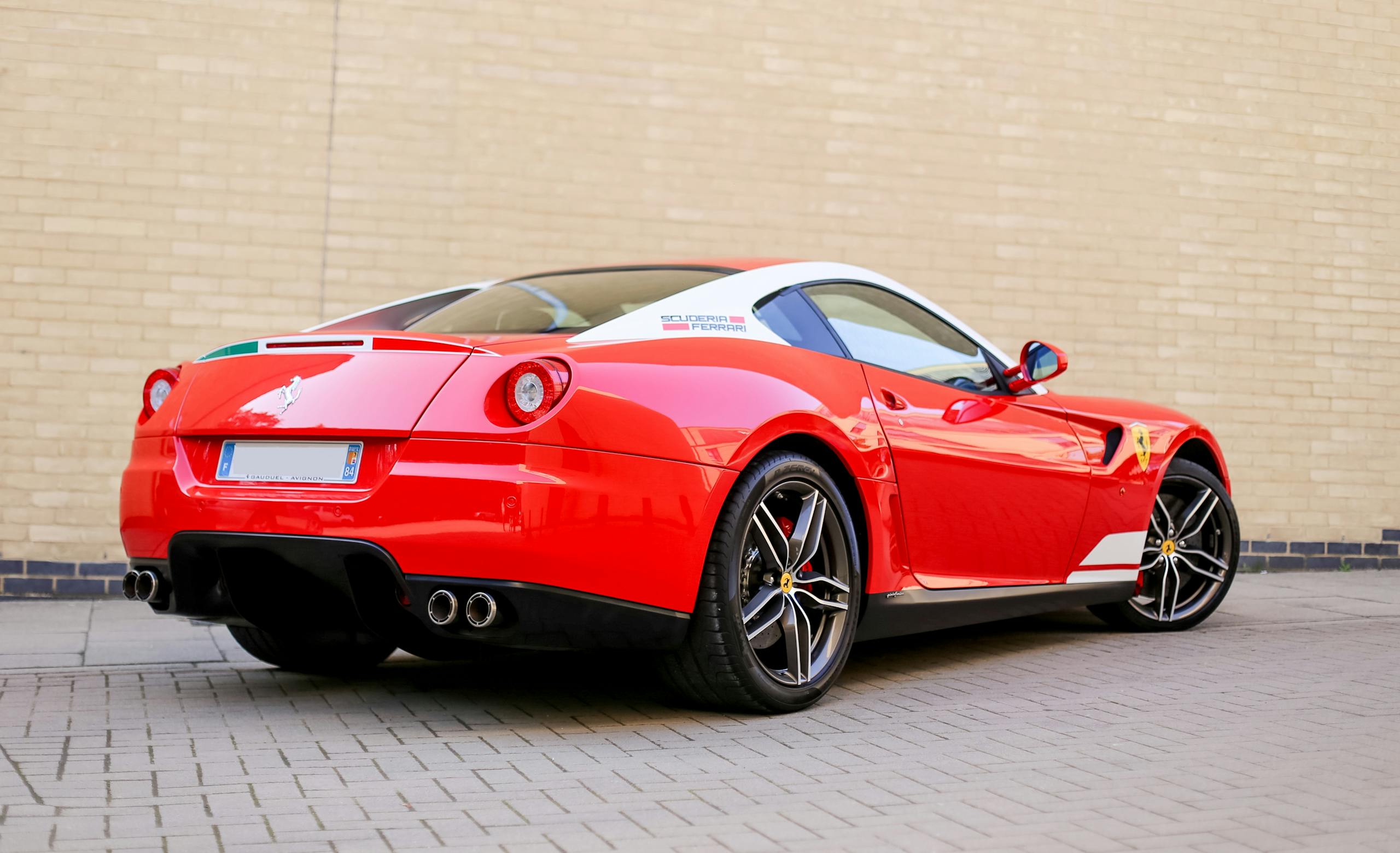Investing in Luxury Assets: Why Entrepreneurs Should Consider High-End Cars Like Ferraris

Luxury cars, particularly high-end models like Ferraris, have long been recognized as symbols of status and wealth. These magnificent vehicles embody unparalleled craftsmanship, advanced engineering, and an unmistakable aura of exclusivity. For many, owning such a car speaks volumes about their success and social standing. Beyond their aesthetic and symbolic appeal, there is a growing realization that luxury cars hold significant potential as lucrative investments.
Traditionally, assets such as stocks, bonds, and real estate have been the focal points of investment portfolios. However, in recent years, an unconventional asset class has garnered the attention of savvy entrepreneurs—luxury automobiles. The appreciation in value of certain high-end vehicles, particularly rare and sought-after models, can rival and even surpass more conventional investments.
The allure of investing in luxury assets, such as Ferraris, lies in their potential to deliver substantial returns. Unlike typical transportation tools, these cars stand out because of their limited production runs, storied heritage, and impressive performance metrics. As demand outstrips supply, the value of such vehicles often appreciates over time, making them a compelling option for diversification within an investment strategy.
For entrepreneurs, the appeal of high-end cars extends beyond mere aesthetics or social cachet. With careful selection and timing, investing in top-tier automobiles can serve as a dynamic component of a comprehensive financial plan. This blog post delves into the reasons why luxury cars, particularly Ferraris, can be considered viable investments for entrepreneurs. We will explore how such investments can yield significant returns, making them worthy contenders in a well-rounded investment portfolio.
Luxury Cars as Investment Vehicles
Investing in luxury assets, particularly high-end cars like Ferraris, presents an intriguing venture for entrepreneurs looking to diversify their investment portfolios. The financial allure of such vehicles is deeply rooted in their historical performance, wherein certain models have not just held their value but have significantly appreciated over time.
Ferrari, a brand synonymous with luxury and performance, boasts a rich history of producing vehicles that become coveted collector’s items. Market analyses have shown that the value of some classic Ferrari models has consistently risen, making them a viable long-term investment. For example, the Ferrari 250 GTO has witnessed remarkable price appreciation, with models fetching over $48 million at auctions. Such financial performance underscores the brand's reputation for producing investment-grade vehicles.
Several factors contribute to the increasing value of luxury cars. Foremost is their rarity. Limited production runs and bespoke features ensure that certain models remain exclusive, increasing their desirability and market worth. Moreover, the demand for well-maintained, historic luxury cars often outstrips supply, driving prices higher. For instance, rarities like the Ferrari F40 or the Enzo can see their values double or triple within a decade due to their limited numbers and continued high demand among collectors and enthusiasts.
In addition to rarity, market trends play a pivotal role in the financial viability of luxury car investments. The classic and exotic car market has exhibited resilience, even during economic downturns, illustrating a relatively stable investment avenue compared to more volatile asset classes. Entrepreneurs with a keen eye for market trends can capitalize on this stability, leveraging their investments in luxury vehicles to balance more conventional portfolio assets.
The appeal of investing in high-end cars goes beyond mere financial returns. It offers a unique blend of passion and profitability, allowing entrepreneurs to derive personal enjoyment from their assets while also benefiting from potential financial gains. This dual appeal makes luxury cars like Ferraris an enticing option for those aiming to diversify their investment strategies with a tangible, prestigious, and potentially lucrative asset.
Understanding the Market for Luxury Cars
The market for luxury cars, particularly high-end brands such as Ferraris, is nuanced and complex. Unlike mass-produced vehicles, luxury cars often derive a significant portion of their value from factors beyond mere functionality. One such factor is brand heritage; iconic brands like Ferrari have a rich history and pedigree that imbue their models with intrinsic worth. Limited production runs further enhance this value by instilling a sense of rarity and exclusivity, which drives up demand among discerning collectors and investors.
Celebrity ownership is another pertinent influencer in this niche market. Cars previously owned by notable personalities often fetch premiums at auctions, as their provenance adds an additional layer of desirability. For instance, a Ferrari once owned by Steve McQueen sold for a staggering sum, underscoring how celebrity association can magnify a car’s value.
Understanding market cycles is essential for any entrepreneur considering investing in luxury assets like Ferraris. Car values can fluctuate based on economic conditions, cultural trends, and even regulatory changes. Hence, savvy investors should keep a close eye on auction house trends, which often serve as barometers for market health. Major auctions by prestigious houses such as Sotheby's or Bonhams frequently set benchmarks that can influence the broader market.
Specialist car brokers play a crucial role in this ecosystem. These experts possess deep knowledge of the intricacies of luxury car values and have access to networks that facilitate high-stakes transactions. Engaging with a reputed broker can provide valuable insights and opportunities that might otherwise remain inaccessible to novice investors.
Notable sales serve as illuminating examples of market dynamics. The sale of a Ferrari 250 GTO for $48.4 million in 2018 shattered previous records, setting a new benchmark for the luxury car market. Such transactions highlight the potential for capital appreciation in high-end vehicles, making them an attractive consideration for entrepreneurs looking to diversify their investment portfolios.
The Entrepreneur’s Guide to Acquiring Luxury Cars
When it comes to investing in luxury assets, acquiring high-end cars like Ferraris can be an appealing option for entrepreneurs. The process, however, requires strategic planning and consideration. Below, we provide a comprehensive guide to help you navigate through the intricacies of purchasing luxury vehicles.
First, sourcing high-end cars entails thorough research. You can start by exploring reputable dealers and auction houses. Websites and events specializing in luxury automobiles are also excellent places to scout for these rare gems. It’s crucial to verify the provenance of the vehicle, ensuring its history is well-documented, which not only preserves its value but also enhances its investment potential.
Negotiating the purchase price is another critical step. Be prepared with comprehensive knowledge about the car's market value and comparable sales. Consider hiring an expert or consultant who specializes in luxury cars to assist in the negotiation process. This can help you secure a fair price and avoid potential pitfalls.
Financing options for high-end cars are diverse. Entrepreneurs might opt for traditional auto loans, leasing, or even utilizing company funds. It’s advisable to analyze these options carefully, weighing their respective tax implications and long-term financial impacts. Investing in luxury cars through a business entity can offer multiple financial advantages, including potential tax deductions and asset protection.
Ongoing maintenance and insurance are significant considerations. High-end cars often require specialized care, and maintenance costs can be substantial. Ensure you have access to certified service centers and consider purchasing an extended warranty. Moreover, premium insurance tailored for luxury vehicles can protect your investment against unexpected situations, so it’s worth comparing different policies to find the best fit.
The importance of provenance and vehicle verification cannot be overstated. A well-documented service history and clear title enhance the car's value and investor confidence. Due diligence in these areas helps safeguard against fraud and ensures the vehicle's authenticity.
Finally, look into leveraging tax benefits. Some jurisdictions offer tax relief on luxury car purchases, particularly when the car is used for business purposes. Structuring the purchase transaction to maximize these benefits can significantly add to the investment's overall financial attractiveness.
In conclusion, while the allure of high-end cars like Ferraris is undeniable, a methodical approach encompassing thorough research, strategic negotiation, and detailed financial planning is essential for entrepreneurs aiming to make a sound investment in luxury assets.
Maintaining and Improving the Value of Your Luxury Car Investment
Investing in luxury assets, such as high-end cars like Ferraris, requires diligent attention to maintain and potentially enhance their value over time. Proper storage is critical to preserving a luxury car's condition. Storing the vehicle in a climate-controlled environment prevents damage from extreme temperatures and humidity, which can affect both the exterior paint and interior materials.
A meticulously followed maintenance schedule is equally important. Regular servicing ensures the vehicle operates at peak performance and prevents minor issues from escalating into costly repairs. Using authorized service centers and genuine parts maintains the car's authenticity, which is crucial for preserving its value.
Authentic restoration practices enhance the vehicle's appeal to potential buyers or collectors. This involves using original or era-appropriate parts and adhering to factory specifications. Proper documentation and a comprehensive service history are valuable assets. Detailed records create transparency and trust, demonstrating the vehicle's well-cared-for history to potential buyers.
To further increase the value of your luxury car investment, consider acquiring rare factory options or limited-edition models. These vehicles often have unique features and limited production runs, making them more desirable. Additionally, joining car clubs or attending exclusive events can connect you with other enthusiasts and potential buyers who appreciate the rarity and value of such investments.
Overall, the key to maintaining and enhancing the value of high-end cars lies in meticulous care, proper documentation, and strategic acquisition. By focusing on these aspects, entrepreneurs can ensure that their investment in luxury assets continues to appreciate over time, maximizing both enjoyment and financial returns.
Entrepreneurs looking to diversify their investment portfolios are increasingly turning to luxury assets, particularly high-end cars like Ferraris, as a viable option. Monetizing these vehicles involves several strategies that not only safeguard the asset but also provide substantial returns. One popular method is selling the luxury cars at high-profile auctions where buyers are willing to pay a premium. These auctions often attract affluent enthusiasts and collectors who value both the vehicle's intrinsic craftsmanship and its potential appreciation over time.
An alternative way to generate income from luxury cars is through leasing them for events. High-end vehicles are prime attractions at weddings, corporate gatherings, and high-society functions. Entrepreneurs can tap into this demand by offering rental services, ensuring that the car is not only a showpiece but also an income generator. Specialized leasing arrangements can be lucrative, especially in bustling metropolitan areas or destinations known for luxury tourism.
Creating content around luxury cars for social media is another lucrative avenue. Platforms like Instagram, YouTube, and TikTok are fertile grounds for engaging car enthusiasts and building a following. This content can range from detailed reviews to lifestyle vlogs showcasing the car’s features and performance. Entrepreneurs can monetize these platforms through ad revenue, sponsored posts, or collaborations with luxury brands. The potential earnings are significant given the high engagement rates associated with premium automotive content.
Strategic timing and marketing play pivotal roles in maximizing returns. Timing the sale of a luxury car to coincide with heightened market interest, such as following a high-profile automotive event, can substantially increase the return on investment. Similarly, targeted marketing campaigns that highlight the car’s history, unique attributes, and pristine condition can attract a focused and willing buyer demographic.
There are numerous success stories among entrepreneurs who have profited from luxury car investments. For instance, a rare Ferrari 250 GTO was sold at auction for an astounding $48.4 million, highlighting the enormous potential for returns. Entrepreneurs who adopt these strategic approaches can harness significant financial benefits from investing in luxury assets like high-end cars, making it a worthwhile consideration for any diversified portfolio.
Digital Marketing Strategies for Luxury Car Dealers
In today's digital age, luxury car dealers must adapt to the evolving landscape by leveraging effective digital marketing strategies to target high-net-worth individuals. A robust online presence is critical for reaching this exclusive market segment. Establishing a strong digital footprint can be achieved through a well-designed website, active social media engagement, and targeted advertising campaigns. Platforms like mph.com, known for featuring high-end car listings, serve as prime examples of how specialized digital spaces can attract affluent buyers.
Luxury car dealers should invest in search engine optimization (SEO) to ensure their websites rank highly on search engines. Effective SEO practices include optimizing website content with relevant keywords such as investing in luxury assets, entrepreneur-focused refinements, and specific car brands like Ferraris. This not only improves organic search visibility but also builds credibility among discerning clients. Paid search advertising can also complement SEO efforts by targeting high-intent keywords, driving qualified traffic to the dealer's website.
Influencer partnerships represent another potent tactic in the digital marketing arsenal for luxury car dealers. Collaborating with influencers who resonate with the affluent community can amplify brand appeal and authentic connection with potential buyers. For instance, influencers who have a genuine affinity for high-performance automobiles can create engaging content that showcases the luxury and performance of Ferraris, thereby indirectly promoting investment in such high-end assets.
Social media campaigns are indispensable for creating buzz and maintaining ongoing engagement with prospective buyers. Platforms like Instagram and LinkedIn allow for the sharing of high-quality visuals, videos, and behind-the-scenes looks at the dealership and its exclusive offerings. Utilizing targeted ad features within these platforms ensures that promotional material reaches the desired audience efficiently.
Successful case studies abound in this domain, such as dealers who have seen significant sales growth through strategic digital campaigns. Examples include utilizing data-driven insights to refine targeting and measuring campaign performance meticulously to optimize ROI. By embracing these digital marketing strategies, luxury car dealers can effectively reach and captivate high-net-worth individuals, ultimately driving sales and fostering long-term customer relationships.
Conclusion
Investing in luxury assets, particularly high-end cars like Ferraris, offers a compelling proposition for entrepreneurs looking to diversify their portfolios and capitalize on unique financial opportunities. One of the primary advantages discussed is the potential for significant financial returns. As classic models and limited editions typically appreciate in value over time, they present not just a lavish purchase but also a profitable investment. Entrepreneurs are adept at recognizing opportunities, and the luxury car market is ripe with potential for those who navigate it wisely.
Moreover, adding a high-end car such as a Ferrari to an investment portfolio serves as a form of diversification. Traditionally, entrepreneurs may focus on stocks, real estate, or business ventures. However, integrating a tangible, appreciating asset like a luxury vehicle can mitigate risk and enhance overall portfolio stability. It provides a physical asset that can be liquidated if necessary, offering a layer of security beyond traditional investments.
Besides financial returns and diversification, investing in luxury cars confers a status symbol that can further benefit business ventures. Owning a prestigious vehicle like a Ferrari not only elevates personal brand but also extends to professional impressions. This can translate into networking opportunities, enhanced client perception, and an elevated sense of trust and success in professional circles.
The thrill of owning and driving a high-end car should not be underestimated either. For many entrepreneurs, the passion for luxury vehicles is a personal dream realized through their financial success. This emotional and experiential aspect adds a non-monetary value that other investments typically cannot provide.
In conclusion, luxury car investments offer a multifaceted value proposition for entrepreneurs. From financial gains and portfolio diversification to elevated status and personal satisfaction, high-end cars like Ferraris can be a valuable addition to an entrepreneurial journey. Aspiring investors should seize the opportunity to delve into this exciting asset class, taking actionable steps to acquire and profit from these prestigious vehicles.






